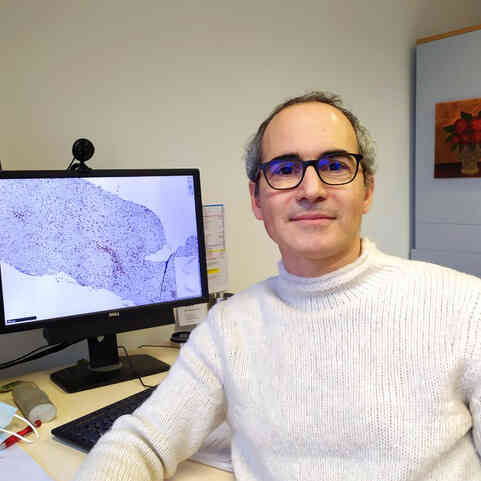- Research Interest
- Selected Publications
- Professional Experience
I am currently working in the section of haematopathology of the Institute of Pathology of the University of Kiel in Germany. I am mostly focusing on the analysis of coding and non-coding genes in the development of different types of B-cell lymphomas. We perform gene expression and mutational analyses as well as a number of in situ analyses on tissue biopsies, in order to associate particular changes either in tumor cells or in the microenvironment, to improve lymphoma classification as well as diagnosis and prognosis.
“LncRNA as Cancer Biomarkers”. Methods in Molecular Biology, vol 2348. (2021).
“Tumor and microenvironment response but no cytotoxic T-cell activation in classic Hodgkin lymphoma treated with anti-PD1”. Blood 136(25):2851-2863. (2020)
“Paracrine recruitment and activation of fibroblasts by c-Myc expressing breast epithelial cells through the IGFs/IGF-1R axis”. Int J Cancer 145(10):2827-2839. (2019)
“lncRNAs and MYC: An Intricate Relationship”. International Journal of Molecular Sciences 18(7): E1497 (2017)
“MINCR is a MYC-induced lncRNA able to modulate MYC’s transcriptional network in Burkitt lymphoma cells.” Proceedings of the National Academy of Sciences USA 112(38):E5261-70 (2015)
“Analysis of secretome changes uncovers an autocrine/paracrine component in the modulation of cell proliferation and motility by c-Myc” Journal of Proteome Research. 10(12):5326–5337 (2011)
“Praf2 is a Novel Bcl-xL/Bcl-2 Interacting Protein with the Ability to Modulate Survival of Cancer Cells”. PLoS ONE 5(12):e15636 (2010)
“Modulation of cellular migration and survival by c-Myc through the down-regulation of urokinase (uPA) and uPA receptor.” Molecular and Cellular Biology 30(7):1838-51 (2010)
I have a strong background as researcher in the fields of biochemistry, molecular biology and cell biology applied to cancer research. I am mainly interested in the understanding of the signal transduction events that drive oncogenic cellular transformation, through the modulation of both coding and non-coding RNAs.


